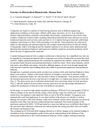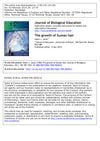 April 2021 in “The journal of investigative dermatology/Journal of investigative dermatology”
April 2021 in “The journal of investigative dermatology/Journal of investigative dermatology” The anti-hair loss shampoo effectively promotes hair growth and improves hair quality.
 January 2021 in “Journal of cosmetology & trichology”
January 2021 in “Journal of cosmetology & trichology” Ageratum conyzoides L. extract may effectively and safely treat hair loss.
 June 2020 in “Journal of Investigative Dermatology”
June 2020 in “Journal of Investigative Dermatology” Scientists successfully grew mini hair follicles using human skin cells, which could help treat baldness.
 June 2020 in “Journal of Investigative Dermatology”
June 2020 in “Journal of Investigative Dermatology” The technique effectively shows how human skin and hair cells form into ball-like structures.

Human hair keratins can self-assemble and support cell growth, useful for biomedical applications.
April 2019 in “The journal of investigative dermatology/Journal of investigative dermatology” A synthetic sandalwood odorant can boost antimicrobial production in hair follicles, making them more resistant to bacteria.
 April 2018 in “The journal of investigative dermatology/Journal of investigative dermatology”
April 2018 in “The journal of investigative dermatology/Journal of investigative dermatology” Researchers created a 3D-printed skin model that grew human hair when grafted onto mice by improving blood supply to the grafts.
 September 2017 in “The journal of investigative dermatology/Journal of investigative dermatology”
September 2017 in “The journal of investigative dermatology/Journal of investigative dermatology” Human hair follicles have a unique way of using energy and might use the Cori cycle; blocking CCR5 could help treat hair loss.
September 2017 in “The journal of investigative dermatology/Journal of investigative dermatology” N-acetyl-GED may help prevent and partially reverse a process that leads to scarring hair loss.
April 2017 in “The journal of investigative dermatology/Journal of investigative dermatology” Human hair follicles can be used to create heart muscle cells.
April 2017 in “Journal of dermatological science” Human hair follicles can produce stem cells that turn into heart muscle cells.
 February 2017 in “International Journal on Advanced Science, Engineering and Information Technology”
February 2017 in “International Journal on Advanced Science, Engineering and Information Technology” Human hair follicle stem cells can grow and turn into skin cells on chitosan templates, which may help in regenerative medicine.
Platelet-rich plasma helps human hair cells grow and survive better.

Human hair follicle cells can be turned into stem cells that may help clone hair for treating hair loss or burns.
 August 2016 in “Journal of Investigative Dermatology”
August 2016 in “Journal of Investigative Dermatology” Human hair follicles have a scent receptor that can influence hair growth.
 April 2016 in “Journal of Investigative Dermatology”
April 2016 in “Journal of Investigative Dermatology” FOL-005, a new substance, was found to reduce hair growth without toxicity when injected into skin, suggesting it could be used to treat excessive hair growth.
June 2014 in “Biotechnology and Bioprocess Engineering” Injecting lab-grown hair cells into the scalp can regrow hair.
 July 2011 in “Microscopy and microanalysis”
July 2011 in “Microscopy and microanalysis” Human hair's structure makes it tough and resistant to breaking.
 March 2010 in “International Journal of Cosmetic Science”
March 2010 in “International Journal of Cosmetic Science” Disulfide bonds affect the melting behavior of hair's crystalline structure, but hair retains some stability even after these bonds are broken.
January 2008 in “Linchuang pifuke zazhi” Betamethasone activates and increases the growth of certain skin cells from hair follicles.
 January 2007 in “The Year book of dermatology”
January 2007 in “The Year book of dermatology” Researchers successfully isolated and identified key stem cells in human hair follicles, which could help develop new skin and hair treatments.
January 2007 in “The FASEB journal” Human hair keratins help nerve regeneration and support Schwann cell activity.
Stretching-setting treatment works for wool and human hair using specific equipment and methods.
January 1997 in “Cosmetics and toiletries” A meadowfoam seed oil derivative can penetrate and repair human hair.
August 1989 in “Proceedings ... annual meeting, Electron Microscopy Society of America/Proceedings, annual meeting, Electron Microscopy Society of America” The research provided a detailed view of the non-keratinous parts of human hair fibers.
 September 1984 in “Journal of Biological Education”
September 1984 in “Journal of Biological Education” Human hair growth involves active, resting, and intermediate phases, and examining plucked hairs can teach students about hair biology and diseases.
 June 1972 in “Archives of internal medicine”
June 1972 in “Archives of internal medicine” Androgens play a key role in hair growth.
April 2023 in “Chinese Medical Journal” Human hair follicle stem cells help repair tendon injuries.
















